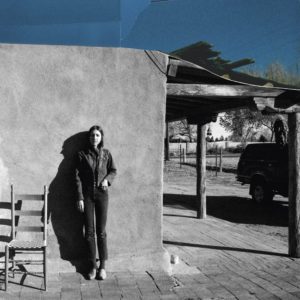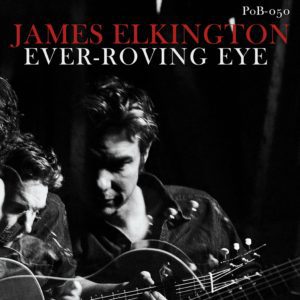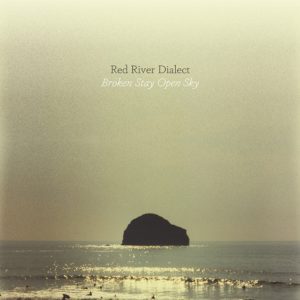Mike Cooper wrote his final songwriter record, a suite of gloaming glam-rock anthems performed with a spiritual jazz trio, while living on the Costa Tropical of Granada, Spain, an era when he was considering retiring from music altogether. A chance encounter and a last-ditch record deal convinced him to make one last album, which he recorded in 1974 at Pathway Studios in London, with “The Greatest Rock and Roll Band in the World,” featuring the inventive South African jazz rhythm section of Louis Moholo and Harry Miller with UK saxophonist Mike Osborne.
This first-ever reissue includes a bonus CD of Milan Live Acoustic 2018, a previously unreleased solo set that represents Cooper’s return, after forty-four years pursuing free improvisation and electronics, to a new, deconstructed approach to singing, steel guitar, and songcraft.
The deluxe LP+CD edition also features a six-panel insert with additional artwork and an essay by the artist about both records. The deluxe 2xCD gatefold edition features an eight-panel version of the same insert.
Highlights
- The first-ever reissue of Life and Death in Paradise, Mike Cooper’s final songwriter record, and the first release of Milan Live Acoustic 2018
- Deluxe LP+CD edition features 140g black virgin vinyl; matte jacket with spot gloss details; and a six-panel foldout insert with additional artwork and an essay by the artist about both records
- Deluxe 2xCD edition features a matte gatefold jacket with spot gloss details, and an eight-panel version of the same insert
- RIYL: Derek Bailey, David Bowie, Tim Buckley, Sandy Bull, John Cale, Michael Chapman, Lol Coxhill, Johnny Dyani, Davey Graham, Steve Gunn, Van Morrison, Louis Moholo, Mike Osborne, Lou Reed, Sonny Sharrock, Television, Welfare State
- Album page/details/acknowledgments
- Artist page/tour dates/links/back catalog
Physical format music purchases from the PoB webstore and Bandcamp include digital downloads when feasible. Some, but not all, pre-2023 vinyl pressings also include a download coupon. For digital preorders and high-resolution digital downloads, please visit our Bandcamp page.
Tracklist
A1. “Rocket Summer” 2:46
A2. “Black Night Crash” (including “Horry Rocker Show”) 12:10
A3. “O.M.M. Coda” 7:31
B1. “Suicide De Luxe” (including “Rock and Roll Hi Way”) 6:15
B2. “Life and Death in Paradise” (including “Through a Veil,” “Beads on a String,” “Reprise”) 10:39
B3. “Critical Incidents” 6:41
CD1. “Migrants Song” 7:31
CD2. “Approaching Zero” 6:47
CD3. “Industrial Hazard” 2:11
CD4. “In Moments of Reverie” 2:32
CD5. “Peach Trees” 7:41
CD6. “Sage and Thyme” 4:43
CD7. “Lord Franklin” 5:05
Catalog Number / Formats / Release Date
Purchase from PoB above or support via
- Bandcamp (LP+CD/2xCD/digital)
- Smart links:
— Life and Death in Paradise digital/streaming album and all physical formats
— Milan Live Acoustic 2018 digital/streaming album only
More from Mike Cooper
-

Mike Cooper: Life and Death in Paradise + Milan Live Acoustic 2018
$11.00 – $27.00Weight N/A FORMAT Album Narrative
- Photo by Vajk Dudas
In the wake of his magisterial triptych of early 1970s avant-folk-rock records—Trout Steel (1970), Places I Know (1971), and The Machine Gun Co. (1972) (all previously reissued by Paradise of Bachelors)—the British songwriter, guitarist, and fledgling improviser Mike Cooper retreated to the Costa Tropical of Granada, Spain. With no prospects for touring or recording again, his fiery band the Machine Gun Co. had disintegrated. Cooper sets the scene in his liner notes of the first-ever reissue of his unjustly forgotten next album Life and Death in Paradise (1974):
“No one came running with offers of fame and riches, and we fell apart, and I left the country and headed for the beach, disillusioned and a bit disorientated musically. I went to Almuñécar in Andalusia, a place I had been going since 1969, because a painter friend from Reading, Rowland Fade—who made the collage in the gatefold of my earlier album Trout Steel—had moved there in 1968.
“It was not exactly a paradise. Palm trees were not native there, so they had been imported by the mayor, purchased from his brother who, legend has it, sourced them from Cuba.”
It was in this synthetic coastal “paradise,” unmoored and adrift, considering retiring from music altogether, that he began tentatively writing new songs.
“Time passed slowly in Almuñécar, and I made leather bags, painted the insides of empty swimming pools, attempted to sell some of my artworks at a market in Málaga, and generally hung out drinking and smoking (cigarettes) at the beachside bars.”
A chance encounter with producer Tony Hall, who offered Cooper a last-ditch record deal on Hall’s nascent Fresh Air label, convinced him to make one last album—with the stipulation that he could assemble what he called “The Greatest Rock and Roll Band in the World.”
“I told Tony that I would do it if I could hire some of my South African jazz musician friends that I had used on my Pye/Dawn albums and some friends from Reading that I still knew and admired. Tony loved jazz and was more than happy for me to use whomever I wanted. I called up Harry Miller, Louis Moholo, and Mike Osborne, who were in fact a trio at the time … and several local Reading heroes, including the singer-songwriter Terry Clarke.”
The result, recorded live with minimal overdubbing at Pathway Studios in London, was Life and Death in Paradise, an utterly singular suite of gloaming glam-rock anthems performed with a spiritual jazz trio comprising the inventive South African jazz rhythm section of Moholo and Miller with UK saxophonist Osborne. Unlike anything else in Cooper’s extensive catalog, the record’s six interwoven songs, world-weary metanarratives about music and the artist’s sunstricken exile in Andalusia, vibrate with heat shimmer and polyphonic pastiche, prefiguring his later tropical travelogues.
“That title of the album became so loaded for me as the years passed and also reflected (still does) my attitude toward certain aspects of the music business. Despite going back to record, I was still not convinced about many things, and a lot of the lyrics on the record express my doubts and anger about it.”
Fresh Air fizzled, and Life and Death became Cooper’s final record as a songwriter, having pushed the form as far as he could. Drifting north from Spain back to the UK, he fell into the scene of the London Musicians Collective (LMC)—including Paul Burwell, David Toop, and saxophonist Lol Coxhill, Cooper’s bandmate in the Recedents—and fully embraced free improvisation.
“I decided that I was no longer interested in the direct, personal experience, narrative type of song or the form in which most songs were framed and presented … I was musically more interested in improvising and not having to play the same thing at every performance.”
He was still, however, interested in singing and lyrics, so, influenced by Tom Phillips, William Burroughs, and Brion Gysin, he began experimenting with text collage and cut-up techniques, arriving at his own hybrid compositional strategy for improvisatory songs.
The previously unreleased solo set Milan Live Acoustic 2018 represents Cooper’s return, after more than four decades pursuing free improvisation and electronics, to a new, deconstructed approach to singing, lap steel guitar, and songcraft. Presented here together with Life and Death in Paradise, the two records provide fascinating bookends to Mike Cooper’s long, mercurial, and pioneering practice as a songmaker.
“In my early years as an acoustic blues player, there was no amplification, even for voice, in most folk clubs where I was performing. Milan Live Acoustic 2018 is in a way a return to my roots as a solo acoustic singer/guitarist, as last fully documented on Life and Death in Paradise forty-four years earlier. It’s just me: my voice, guitar, and some small electronic devices played with no amplification. The only preparation was the lyrics, which can change from performance to performance as well. Everything else is improvisation. What else is there?”
Videos and Streaming
Acknowledgments
Beautiful, fucked-up mid-70s rock that’s really not like anything else. A mélange of mersh/avant/blues/folk/rock/jazz shiteroo, Life and Death in Paradise is a most splendid anomaly with hints of everyone from Gram Parsons to Michael Hurley to the Welfare State … Allow it into your head, and it will blossom like the strange mushroom it is.
– Byron Coley
A strange mélange of folk rock and post-John Coltrane jazz with some unexpected glam dalliances … It’s a fascinating album, and one can sense how the song format is straitjacketing Cooper, who’s yearning for the open road.
– The Wire
Cooper basks in his newfound idyll, somewhere beneath the trees … his contentment seems complete, eased by sunshine and sweet orange wine.
– Uncut
A world-weary would-be swansong by a maverick songwriter with nothing left to lose, Life and Death in Paradise is a portrait of Mike Cooper’s iconoclastic brilliance shining like the strange and glorious diamond it is, forever ahead of its time.
– Aquarium Drunkard
Its musical adventurism heralded Cooper’s 40 years as a titan of British improvised music and cut-up specialist.
– MOJO
At times firmly songs, and at other times improvised country blues melodies, it’s an inward-looking masterwork.
– Bandcamp Daily
Heard together, these two albums affirm Cooper’s enduring capacity to turn not much into something special.
– Magnet
At this point, let us ask ourselves a question and give ourselves an answer: when will we decide to consider Cooper for what he is, namely, one of the greatest musicians the British folk-blues/improv scene has known?
– BlowUp
Mike Cooper is spawned from a breed of truly original artists who have steadfastly followed their own path. … Life and Death in Paradise lands somewhere between Dylan, prime Van Morrison and early days Springsteen. But it’s the ingenious inclusion of the South African rhythm duo of enigmatic drummer Louis Moholo and bassist Harry Miller, plus free jazz saxophonist Mike Osborne, that really propels this record in a new direction and sets Cooper on the path to the next phase of his career.
– Shindig
At times firmly songs, and at other times improvised country blues melodies, it’s an inward-looking masterwork.
– Bandcamp
Ultimately, this is a distinctive, personal work, as heard on dazzling songs such as “Suicide De Luxe,” “Critical Incidents,” and the vivid title track.
– Record Collector
While there’s still a folk rock base to most of the songs on this record, Cooper and the trio launch off into prog-laced folk-jazz and even starry-eyed glam rock that recalls Marc Bolan or Bowie’s earliest Ziggy experimentations.
– Record Crates United
ACKNOWLEDGMENTS FOR MIKE COOPER AND OUR PREVIOUS REISSUES
8.6: Best New Reissue. Trout Steel has the gracefully exhaled quality of a master statement. The album mostly moves in long, heaving sighs—long, free-flowing sections where Cooper plays in open tunings and clusters of instruments take their turns speaking to each other around him… Sung verse[s] alternate with extended jamming like honey running from a spoon. In a way, he’s like Van Dyke Parks; equally in love with traditions and in thrall to eccentricity, someone whose solo records build an alternate set of rules that their maker has no intention of spelling out for you.
– Jayson Greene, Pitchfork
Best reissues of 2014. The sound of a folk-rooted prodigy navigating the rapids of psychedelia. What puts his music in a league of its own is his taste for free-jazz-style instrumental play, with his own slithery slide guitar darting through abstract arrays of horns, strings, piano and percussion. Here, his singer-songwriter and experimental sides form a gnarly yin-yang marriage.
– Will Hermes, Rolling Stone
One of the pre-eminent players on the Brit folk and blues scenes. Given his organic approach to composing; his truly dazzling abilities with acoustic and slide guitars; and his predilection for just the right sidemen and arrangements, Cooper was among the most poised musicians of his generation, and Trout Steel proves the point time and again over its 11 tracks. What a ride Trout Steel is: exhilarating and adventurous each time it is played.
– Thom Jurek, Allmusic
8/10. For those of us interested in how roots music can intersect with the avant-garde, the rediscovery of guitarist Mike Cooper is a fortuitous one. These exceptional LPs reflect the freedoms and open-minded spirit of the times. Trout Steel showcases singer-songwriterly craftsmanship in the Jansch mold, occasionally dissolving into free jazz drift (the 11-minute “I’ve Got Mine” is a fidgety, minimalist precursor to Wilco’s “Less Than You Think.”)
– Uncut
4 stars. Charts Cooper’s “voyage out” with his warm folk songs venturing into Pharaoh Sanders-inspired skronk… with a grasp of the infinite worthy of the Incredible String Band.
– Matt Poacher, MOJO
4 stars. A deconstruction of folk music that simultaneously bypasses the mainstream rock of the day, sustained on a knife-edge by Cooper’s underlying guitar… It’s completely unconventional, immediately setting Cooper apart from anybody else in the early 70s folk circle. A rewarding, intriguing body of work.
– Mick Houghton, Record Collector
His 1970 album Trout Steel really steals the show as a whole.
– Laura Barton, The Guardian
For the lot of us uninitiated to Mike Cooper and his 1970 LP, Trout Steel, it’s a doozie. Earnestly reissued by Paradise of Bachelors and produced by Peter Eden (Donovan, Bill Fay), Trout Steel eloquently connects brit folk to free jazz with ease and originality. An exploratory work that makes a lasting impact on the folk genre… and puts Cooper in a world all his own. One can’t help but feel that there are many artists (both past and present) who owe a debt to Mike Cooper – whether they know it or not.
– Randy Reynolds, The Big Takeover
Cooper was forging connections between folk and experimental musics long before America got New or Weird…
– Keith Moliné of Pere Ubu, for The Wire
Essential reissues. Taken together, Trout Steel, Places I Know and The Machine Gun Co. with Mike Cooper provide a suggestive map of the post-modern eclecticism that’s blossomed in an age where the extremes of the world’s collected music can be accessed with the few taps of a button. Saxophones shriek beneath simple chords. Would-be ballads veer suddenly through psychedelic spirals. In retrospect, Cooper’s decisions feel suspiciously prophetic, like a long-range weathervane more interested in the future than present atmospheric conditions. 40 years later, Cooper’s work remains germane, even prescient.
– Grayson Currin, Independent Weekly
Trout Steel and Places I Know / The Machine Gun Co. with Mike Cooper are both excellent records, but they also tell a vital story about an important musician in modern music. These two albums capture Cooper at a pinnacle, where his newly honed songcraft and his knack for complicated sound and space met, clashed, and also combined in exciting and brilliant ways. These are reissues, but they may as well be new albums. They are as fresh as the latter and as lasting as the best of the former. By turns challenging and beautiful, earthen and ethereal.
– Matthew Fiander, PopMatters
Remarkable, groundbreaking albums that fuse folk, blues, psych, and avant-garde free jazz. Each of these records presents Cooper’s career in microcosm, shifting fluidly from country blues to psych rock to free improvisation and jazz idioms.
– Clinton Krute, BOMB
The work of a unique artist, one whose songcraft is always bolstered by relentless experimentation.
– Aquarium Drunkard
Hauntingly beautiful. His clear yet weary voice is the kind that’s made for storytelling, and Cooper sure tells some fascinating narratives across these records. Not only are his songs an evolved collection of should-be classics, but they’re also a piece of history that’s longing to be uncovered.
– Maeri Ferguson, The Horn
You only need to listen to these three albums to appreciate how far ahead of the game he was.
– Folk Radio UK

































